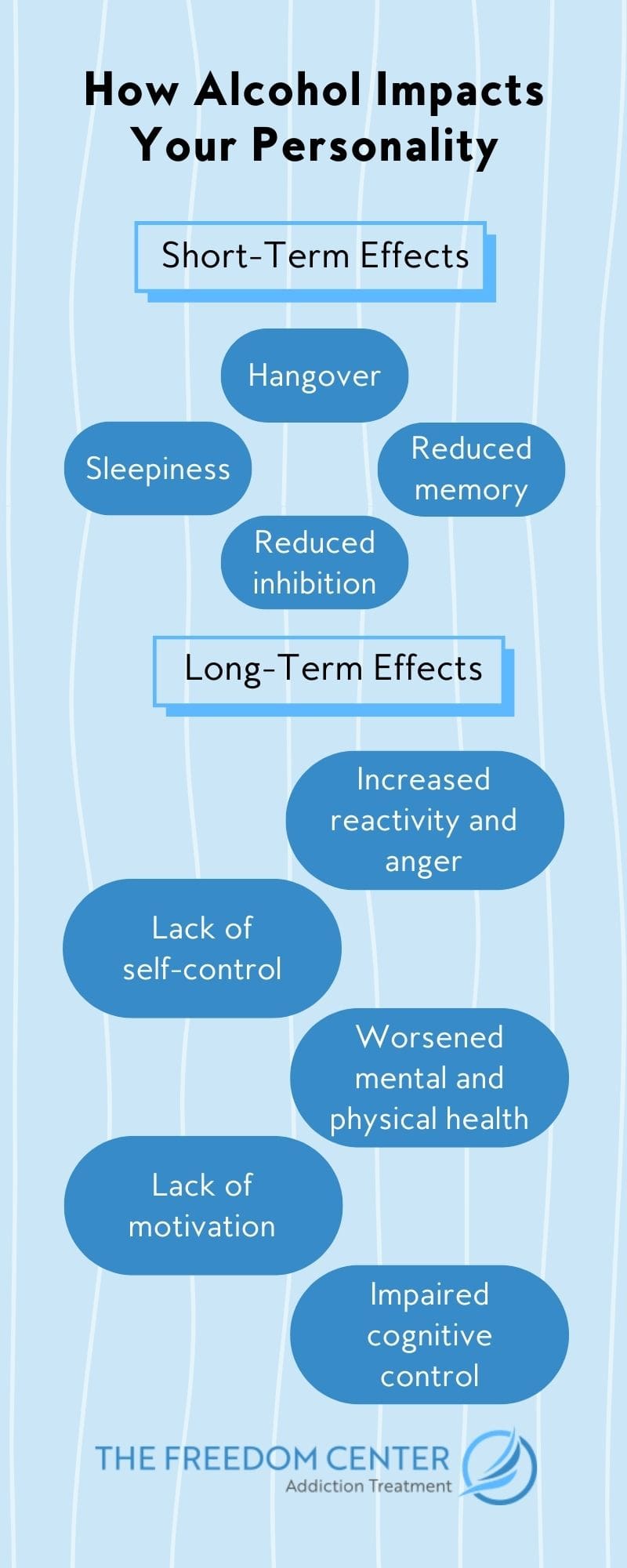Alcohol can have a profound and immediate effect on your behavior. Alcohol will change your personality, at least temporarily. However, it’s essential to understand how alcohol influences your emotions and behaviors. Long-term alcohol abuse can have somewhat permanent personality changes in some people.
Can Drinking Change Your Personality Long-Term?
The answer is yes. Alcohol can change your personality long-term, which may cause you to develop a drinking problem. Alcohol can cause damage to the brain, which could lead to personality changes or act as a trigger for other mental health issues like anxiety or depression.
Alcohol also slows down messages from your brain to other body parts, leading to slower reflexes and impaired judgment and motor skills. While some people may be able to tolerate these side effects without experiencing any long-term consequences for their health or well-being, many others will end up suffering severe health issues.

Short-Term Effects of Alcohol
Alcohol can influence your mood, behavior, and even personality. Drunkenness gives you a temporary change in personality and behavior.
When we become intoxicated, our judgment becomes impaired, which can cause us to act in ways that are out of character for us. A usually shy person may become more outgoing or flirtatious when drinking; someone who usually doesn’t drink alcohol might become belligerent or violent after only one too many drinks.
The short-term effects of alcohol can include:
- Hangover. This is a combination of headache, nausea, dizziness, fatigue, irritability, and an upset stomach.
- Sleepiness. Alcohol can make you tired and slow down your body’s functions, making it challenging to stay awake during the day or night.
- Reduced inhibition. You might say things you don’t mean because alcohol lowers your inhibitions and makes you more open about what is on your mind (the good and bad).
- Reduced memory. Alcohol affects how fast your brain works, so it may be hard for you to remember what happened when drunk, even if it happened just hours ago.
Long-Term Effects of Alcohol
Alcoholism is a chronic, lifelong illness that causes physical and mental changes in the brain. These include brain damage, alcohol addiction, co-occurring disorders, and nutritional deficiencies that cause weight loss and brittle bones.
The longer you have been drinking heavily or regularly over years or decades, the more likely you are to experience it will be permanent damage to your brain’s structure and function.
The long-term effects of alcohol can include:
- Increased reactivity and anger. Because alcohol causes the prefrontal cortex to shrink, it decreases self-control and increases anger. As a result, people who drink are more likely to display aggressive behavior when under stress or angry than those who don’t drink as much or at all.
- Lack of self-control. Alcohol affects the brain, which is the control center for your personality. Alcohol can cause damage to the brain, which leads to a lack of self-control. This effect makes people more likely to engage in risky behaviors.
- Worsened mental and physical health. Alcohol abuse can cause brain damage and lead to depression, anxiety, suicide, and memory loss. Liver cirrhosis is another common problem caused by alcoholism.
- Lack of motivation. Alcohol can make you feel drained, both physically and emotionally. When you drink alcohol, it lowers your inhibitions—you’re more willing to try new things and take risks. But all that energy can be counterproductive in the long run: when you’re hungover, it’s challenging to get motivated to do anything other than sleep or eat junk food.
- Impaired cognitive control. Cognitive control can be impaired by alcohol use because it reduces a person’s ability to monitor their thoughts or actions and focus attention on stimuli in the environment. Alcohol abuse can also impair working memory (the ability to remember and process currently relevant information).
Finding Help for Alcohol Abuse
It’s possible to become physically dependent on alcohol, which means you experience withdrawal symptoms when you stop drinking, even if you don’t have a physical addiction. Symptoms of withdrawal can include nausea, shaking hands, anxiety, and seizures — so if you’re experiencing any symptoms like these after not having a drink in some time, talk to your doctor.
If you or someone you know is dealing with alcohol abuse problems, consider seeking help. Speak with an addiction specialist or attend an Alcoholics Anonymous (AA) meeting in your area to start seeking help for your addiction. Recovery and sobriety are possible. You need to take the first step.
Sources:
http://journals.sagepub.com/doi/10.1177/2167702616689780
https://www.jwatch.org/na46402/2018/04/02/alcohol-use-adults-may-lead-detrimental-personality











































